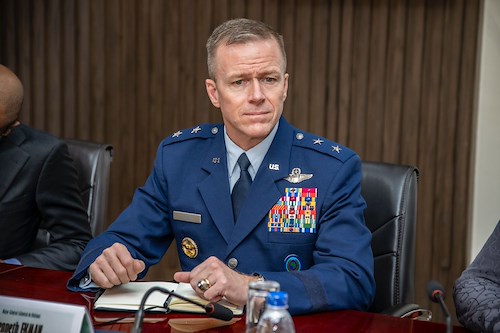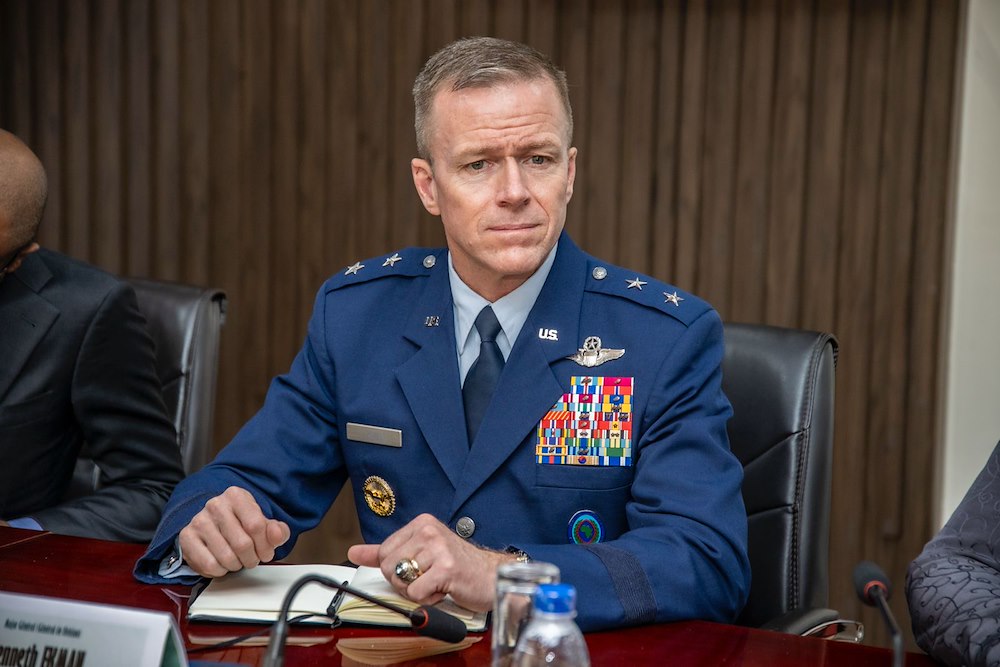Gallery contains 7 images
×
Photo 1 of 7
U.S. Africa Command
Ms. Amanda Dory, Acting Under Secretary of Defense for Policy, Ms. Maureen Farrell, Deputy Assistant Secretary of Defense for African Affairs, and U.S. Air Force Maj. General Kenneth Ekman, U.S. Africa Command (AFRICOM) Coordination Element visited with Côte d'Ivoire’s Minister of Defense M. Téné Birahima Ouattara during a key diplomatic trip aimed at strengthening defense and security cooperation between the United States and Coastal West Africa.
The AFRICOM Coordination Element (ACE) is part of the U.S. Africa Command (AFRICOM), a unified combatant command responsible for U.S. military activities across the African continent. The ACE supports AFRICOM's mission in West Africa by enhancing coordination, communication, and integration with various U.S. government agencies, host nations, and international partners.
Photo by: U.S. Africa Command Public Affairs
Photo 2 of 7
U.S. Africa Command
Ms. Amanda Dory, Acting Under Secretary of Defense for Policy, Ms. Maureen Farrell, Deputy Assistant Secretary of Defense for African Affairs, and U.S. Air Force Maj. General Kenneth Ekman, U.S. Africa Command (AFRICOM) Coordination Element visited with Côte d'Ivoire’s Minister of Defense M. Téné Birahima Ouattara during a key diplomatic trip aimed at strengthening defense and security cooperation between the United States and Coastal West Africa.
The AFRICOM Coordination Element (ACE) is part of the U.S. Africa Command (AFRICOM), a unified combatant command responsible for U.S. military activities across the African continent. The ACE supports AFRICOM's mission in West Africa by enhancing coordination, communication, and integration with various U.S. government agencies, host nations, and international partners.
Photo by: U.S. Africa Command Public Affairs
Photo 3 of 7
U.S. Africa Command
Ms. Amanda Dory, Acting Under Secretary of Defense for Policy, Ms. Maureen Farrell, Deputy Assistant Secretary of Defense for African Affairs, and U.S. Air Force Maj. General Kenneth Ekman, U.S. Africa Command (AFRICOM) Coordination Element visited with Côte d'Ivoire’s Minister of Defense M. Téné Birahima Ouattara during a key diplomatic trip aimed at strengthening defense and security cooperation between the United States and Coastal West Africa.
The AFRICOM Coordination Element (ACE) is part of the U.S. Africa Command (AFRICOM), a unified combatant command responsible for U.S. military activities across the African continent. The ACE supports AFRICOM's mission in West Africa by enhancing coordination, communication, and integration with various U.S. government agencies, host nations, and international partners.
Photo by: U.S. Africa Command Public Affairs
Photo 4 of 7
U.S. Africa Command
Ms. Amanda Dory, Acting Under Secretary of Defense for Policy, Ms. Maureen Farrell, Deputy Assistant Secretary of Defense for African Affairs, and U.S. Air Force Maj. General Kenneth Ekman, U.S. Africa Command (AFRICOM) Coordination Element visited with Côte d'Ivoire’s Minister of Defense M. Téné Birahima Ouattara during a key diplomatic trip aimed at strengthening defense and security cooperation between the United States and Coastal West Africa.
The AFRICOM Coordination Element (ACE) is part of the U.S. Africa Command (AFRICOM), a unified combatant command responsible for U.S. military activities across the African continent. The ACE supports AFRICOM's mission in West Africa by enhancing coordination, communication, and integration with various U.S. government agencies, host nations, and international partners.
Photo by: U.S. Africa Command Public Affairs
Photo 5 of 7
U.S. Africa Command
Ms. Amanda Dory, Acting Under Secretary of Defense for Policy, Ms. Maureen Farrell, Deputy Assistant Secretary of Defense for African Affairs, and U.S. Air Force Maj. General Kenneth Ekman, U.S. Africa Command (AFRICOM) Coordination Element visited with Côte d'Ivoire’s Minister of Defense M. Téné Birahima Ouattara during a key diplomatic trip aimed at strengthening defense and security cooperation between the United States and Coastal West Africa.
The AFRICOM Coordination Element (ACE) is part of the U.S. Africa Command (AFRICOM), a unified combatant command responsible for U.S. military activities across the African continent. The ACE supports AFRICOM's mission in West Africa by enhancing coordination, communication, and integration with various U.S. government agencies, host nations, and international partners.
Photo by: U.S. Africa Command Public Affairs
Photo 6 of 7
U.S. Africa Command
Ms. Amanda Dory, Acting Under Secretary of Defense for Policy, Ms. Maureen Farrell, Deputy Assistant Secretary of Defense for African Affairs, and U.S. Air Force Maj. General Kenneth Ekman, U.S. Africa Command (AFRICOM) Coordination Element visited with Côte d'Ivoire’s Minister of Defense M. Téné Birahima Ouattara during a key diplomatic trip aimed at strengthening defense and security cooperation between the United States and Coastal West Africa.
The AFRICOM Coordination Element (ACE) is part of the U.S. Africa Command (AFRICOM), a unified combatant command responsible for U.S. military activities across the African continent. The ACE supports AFRICOM's mission in West Africa by enhancing coordination, communication, and integration with various U.S. government agencies, host nations, and international partners.
Photo by: U.S. Africa Command Public Affairs
Photo 7 of 7
U.S. Africa Command
Ms. Amanda Dory, Acting Under Secretary of Defense for Policy, Ms. Maureen Farrell, Deputy Assistant Secretary of Defense for African Affairs, and U.S. Air Force Maj. General Kenneth Ekman, U.S. Africa Command (AFRICOM) Coordination Element visited with Côte d'Ivoire’s Minister of Defense M. Téné Birahima Ouattara during a key diplomatic trip aimed at strengthening defense and security cooperation between the United States and Coastal West Africa.
The AFRICOM Coordination Element (ACE) is part of the U.S. Africa Command (AFRICOM), a unified combatant command responsible for U.S. military activities across the African continent. The ACE supports AFRICOM's mission in West Africa by enhancing coordination, communication, and integration with various U.S. government agencies, host nations, and international partners.
Photo by: U.S. Africa Command Public Affairs
Ms. Amanda Dory, Acting Under Secretary of Defense for Policy, Ms. Maureen Farrell, Deputy Assistant Secretary of Defense for African Affairs, and U.S. Air Force Maj. General Kenneth Ekman, U.S. Africa Command (AFRICOM) Coordination Element concluded their visit to Benin and Côte d'Ivoire, a key diplomatic trip aimed at strengthening defense and security cooperation between the United States and Coastal West Africa.
The visit featured high-level engagements with senior defense officials and military leaders. The trip reinforced the enduring commitment from U.S. Department of Defense and AFRICOM to regional stability and security in West Africa.
The U.S. Delegation began the visit in Cotonou, Benin, where they met with several senior leaders, including Minister of Finance Romuald Wadagni, Minister of Foreign Affairs Olushegun Adjadi Bakari, Minister of Defense Fortunet Nouatin, and Chief of Defense Staff Major General Fructueux Gbaguidi. Alongside the U.S. delegation discussed opportunities to deepen defense cooperation, enhance regional security frameworks, and address complex security challenges such as violent extremism, maritime security, and transnational crime.
"Benin is an essential partner in West Africa," said Maj. General Kenneth Ekman, ACE lead. "We are committed to building on our mutual efforts to advance regional security and stability."
Later in the week, the U.S. delegation traveled to Abidjan, Côte d'Ivoire, where they met with Minister of Defense Tene Ouattara, Minister Director of the President’s Cabinet Fidele Sarassoro, and other senior Ivoirian security officials for in-depth talks on strengthening bilateral defense cooperation, countering violent extremism, and securing the region’s maritime trade routes. These discussions were supported by the leadership of Maj. General Kenneth Ekman, who reinforced the importance of close collaboration between the two nations militaries.
"Côte d'Ivoire plays a vital role in the security of West Africa," said Maj. General Ekman. "We are committed to our growing partnership which is essential for addressing shared security challenges."
Throughout the visit, the U.S. delegation emphasized the importance of continued engagement with African partners to tackle shared security challenges. Key topics included countering terrorism, maritime piracy, and regional instability, as well as building sustainable security capacity in both Benin and Côte d'Ivoire. The visit highlighted the shared resolve to develop innovative strategies to address these threats and ensure a secure, stable, and prosperous future for the region.
The AFRICOM Coordination Element (ACE) is part of the U.S. Africa Command (AFRICOM), a unified combatant command responsible for U.S. military activities across the African continent. The ACE is responsible for supporting AFRICOM's mission in West Africa by enhancing coordination, communication, and integration with various U.S. government agencies, host nations, and international partners.
U.S. Africa Command is one of seven U.S. Department of Defense geographic combatant commands. The command is responsible for all U.S. military operations, exercises, and security cooperation, and conducts crisis response on the African continent to advance U.S. interests and promote regional security, stability, and prosperity.
For more information, visit our website, Facebook and Twitter pages, or contact U.S. Africa Command Media Relations at africom-pao-media@mail.mil.


























